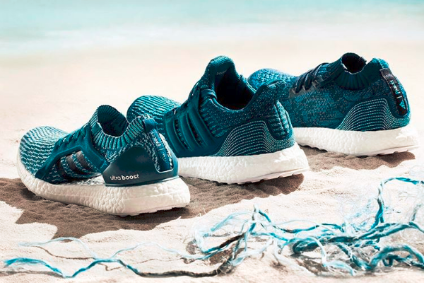
German sportswear company Adidas has been named leader in its industry in this year’s Dow Jones Sustainability Index, fighting off competition from major household names including Burberry, Hugo Boss and Kering who were also named among the best-in-class sustainability performers globally.
The annual DJSI review evaluates the sustainability performance of the largest 2,500 companies listed in the Dow Jones Global Total Stock Market Index. It is based on an analysis of corporate economic, environmental and social performance, assessing issues such as corporate governance, risk management, branding, climate change mitigation, supply chain standards and labour practices.

Discover B2B Marketing That Performs
Combine business intelligence and editorial excellence to reach engaged professionals across 36 leading media platforms.
Adidas AG – which has been included in the DJSI for the 19th consecutive year – led the Textiles, Apparel and Luxury Goods sector in RobecoSAM’s Corporate Sustainability Assessment, based on its total sustainability score in 2018 regarding its corporate economic, environmental and social dimensions. Furthermore, the company was rated industry best in seven criteria: innovation management, materiality, supply chain management, human rights, environmental policy and management systems, operational eco-efficiency, social reporting.
“As part of its sustainability strategy – launched in 2016 – the company translates its sustainable efforts into tangible goals and measurable objectives until 2020,” Adidas said in a release announcing the news. “Among its key priorities are using more sustainable materials in its production, tackling the ever-growing issue of water scarcity or the empowerment of its supply chain workers”.
Also included in the world region were Burberry Group for the fourth consecutive year and Hugo Boss.
Last year, Burberry launched its new responsibility agenda, Creating Tomorrow’s Heritage, focusing on three goals that cover the entire footprint of Burberry’s operations: Invent new approaches to revaluing waste, whilst becoming carbon neutral in its own operations; ensure 100% of Burberry’s products have more than one attribute that drives positive change; support one million people in the communities that sustain Burberry’s business and the wider luxury industry.

US Tariffs are shifting - will you react or anticipate?
Don’t let policy changes catch you off guard. Stay proactive with real-time data and expert analysis.
By GlobalData“At Burberry, we are passionate about finding ways to be socially and environmentally responsible in everything we do, from investing in the communities at the heart of our business to creating innovative ways to tackle the most pressing issues faced by our industry,” says Leanne Wood, Burberry’s chief people, strategy and corporate affairs officer. “We will continue to expand these efforts as we work towards our responsibility goals to 2022 and beyond.”
Japanese sportswear brand Asics celebrated its fourth time as part of the DJSI. Asics is listed under the Asia region of the DJSI.
In June this year, the company said it planned to cut its carbon footprint by 33% in line the Science-Based Targets Initiative. It also said it would cut supply chain carbon emissions by 55% of 2015 levels per product made.
“Asics will continue to strive to fulfil its vision to ‘Create Quality Lifestyle through Intelligent Sport Technology’ and to work with business partners that share its commitment to a sustainable and fair sporting goods industry,” the company said in a statement.
For the DJSI North America region, Nike was listed, as was Gildan Activewear for the sixth consecutive year.
Gildan’s environmental goals include minimising waste, decreasing emissions, optimising the use of natural resources and pursuing continuous improvements in every aspect of its operations, from yarn spinning and textile manufacturing to garment sewing.
Since 2015, Gildan has decreased water usage intensity by 17% through investments in high-efficiency dyeing machines, water management systems and chemical innovation in wet processes. Gildan also recycled or repurposed 86% of its total company waste last year and generated 43% of its total energy needs through renewable sources made possible through investments in Biomass steam generation systems, which burn agricultural and factory waste as a primary fuel source.
“We are proud to again be included on the Dow Jones Sustainability North America Index,” said Claudia Sandoval, vice president, corporate citizenship, Gildan. “Receiving this recognition as one of a small group of leading apparel companies is a great validation of the tremendous efforts of our people. Following a comprehensive materiality assessment with key stakeholders this year, we revised our Genuine Responsibility program to focus on three commitments, namely, caring for our employees, conserving the environment and creating strong communities. The investments and efforts we make against these commitments further support our vision of Making Apparel Better.”





